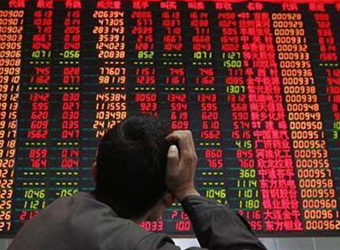Asian indexes edged down on Monday despite the firmer lead from Wall Street last week. Chinese markets traded lower as investors kept an eye on developments in the bond market while South Korea’s Kospi slid on weakness in tech names.
Japan’s Nikkei 225 erased early gains to slip 0.47 percent. Trading houses and manufacturing names made losses, but some notable names continued to cling to gains.
Toyota was up 0.2 percent as other major automakers traded lower and SoftBank Group gained 0.03 percent. Nintendo rose 2.36 percent on investor optimism following reports that Black Friday and Thanksgiving deals in the U.S. had brought in solid sales.
Across the Korean Strait, the Kospi fell 1.34 percent, with tech stocks dragging on the broader index. Market movers included SK Hynix and LG Display which lost 2.47 percent and 1.76 percent respectively.
Samsung Electronics tumbled 4.4 percent after a Morgan Stanley report downgraded the stock to “equal weight” from “overweight” and lowered its price target to 2.8 million won per share, Reuters reported.
The Korean won was in focus ahead of the Bank of Korea’s Thursday interest rates decision, with a majority of economists polled by Reuters last month indicating that a 25 basis point rate hike was expected. The currency traded at 1,087.40 won to the dollar, near its strongest levels in around two and a half years.
Down Under, the S&P/ASX 200 inched higher by 0.22 percent after flatlining earlier in the session. Resource plays Rio Tinto and BHP seesawed, finishing the session in the money after dipping during the day. Energy-related stocks were downbeat, with Santos falling 0.39 percent. Greater China equities edged down as markets continued to focus on climbing bond yields on the mainland.
Greater China equities edged down as markets continued to focus on climbing bond yields on the mainland.
The Shanghai Composite lost 0.81 percent and the Shenzhen Composite shed 0.54 percent, with telcos, financials and tech among the worst-performing sectors.
Hong Kong’s Hang Seng Index was down 0.49 percent. Property plays traded in Hong Kong came under pressure during the session, with Evergrande losing 3.36 percent and Sun Hung Kai edging down 0.4 percent.
Stateside, U.S. stocks closed higher on Friday, with retail stocks notching gains as investors tooks bets on a strong holiday shopping season.
The Dow Jones industrial average rose 0.14 percent, or 31.81 points, to close at 23,557.99 and the S&P 500 edged up 0.21 percent to close at 2,602.42 — its first time finishing above the 2,600 mark.
Chinese industrial companies saw their profits grow 25.1 percent in October compared to the year before, according to Reuters. That was a touch below the 27.7 percent rise seen in September.
Germany was in the spotlight over the weekend, with the center-left Social Democratic Party (SPD) reversing course over coalition talks with Chancellor Angela Merkel’s Christian Democratic Union. A member of the SPD on Saturday indicated that party members were likely to approve entering a coalition with the CDU if SPD leaders made a “convincing proposal.”
On the data front, business confidence data in Germany hit a record level in November, according to data released Friday. The Ifo survey rose to 117.5 compared to the 116.6 projected in a Reuters poll.
The euro traded higher on Friday following those developments, touching as high as $1.1944 during the session. The common currency pared some gains to trade at $1.1922 at 12:52 p.m. HK/SIN, but still traded near two-month highs.
Elsewhere, China announced Friday it would be reducing tariffs on 187 consumer goods. The tariff cuts, which will affect everything from special infant milk formula to clothing, are set to take effect from Dec. 1, 2017.
Meanwhile, bitcoin hit yet another record high as investor interest picked up during the holiday season. The cryptocurrency cracked the $9,600 mark on Monday, according to industry site CoinDesk.
The dollar was steady against a basket of major currencies. The dollar index stood at 92.794 at 12:51 p.m. HK/SIN, near its lowest in around eight weeks. The greenback lost steam after initially firming against the yen, with the U.S. currency slipping to 111.33 after rising as high as 111.68 during the session.
“We remain cautious of expectations for a flatter U.S. bond yield curve driving the dollar index lower,” said Philip Wee, FX strategist at DBS Group Research, in a morning note.
Yields on short-term U.S. Treasurys have risen ahead of an expected Federal Reserve interest rate hike in December, while yields on the 10-year Treasury have been flat “on the Fed’s discomfort” with low U.S. inflation, Wee added.
Oil markets were in focus ahead of a Nov. 30 meeting among major oil producers. Ahead of that meeting, Russia indicated that it was prepared to support a deal that extended an ongoing OPEC-led output cut.
Brent crude futures were 0.06 percent lower at $63.82. U.S. crude futures were off 0.46 percent at $58.68 per barrel after settling at a two-year high of $58.95 last week.
Source: CNBC
